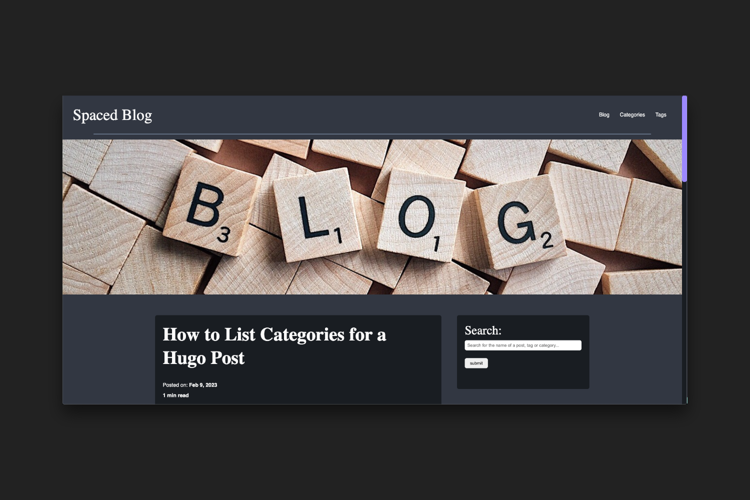Hugo Themes
Spaced Blog
A beautifully simplistic blog theme. Mobile responsive, dark mode, a11y support and page search out of the box.
- Author: Luke Morgan
- Minimum Hugo Version: 0.55.0
- GitHub Stars: 0
- Updated: 2023-02-20
- License: MIT
- Tags: Blog Dark Dark Mode Light Minimal Responsive

Spaced Blog Theme
A beautifully minimalistic Hugo theme for blogs. With dark mode, page search and a11y out of the box.
TODOS:
- Add author social media icon support
- Add about the author block for single post
- Add
copy to clipboardfor block-level code elements - Add support for single post author override
- Add support for multiple authors per post

Main features:
- Dark mode support
- a11y support
- Page search
- Mobile responsive
- Blog author accreditation
- Configurable colors
- Configurable banner images
Installation
Create a new Hugo site:
$ hugo new site [path]
Clone this repository into themes/ directory:
$ cd [path]
$ git submodule add https://github.com/Morgscode/hugo-theme-spaced-blog.git themes/spaced-blog
Add this line in the config.toml file:
theme = "spaced-blog"
Configuration
Site params
In your config.toml file, define the following variables in params:
description= This will be the default html meta description for the blog and it’s homepage. It can be overridden by setting a description in the front-matter of any page or post.useCover: wether or not you want to use a banner images for the blog and its posts[[params.author]][[params.author]]name: The name of the primary blog author[[params.author]]description: The primary blog author’s description
To set the blog author’s avatar image - place an image named blog-author.jpg in your sites /content/images folder.
To add a menu item, add the following lines in menu:
[[menu.menu_name]]
identifier = "item-identifier"
name = "Item Name"
url = "/item-slug"
The basic menu structure you’ll need for this theme is:
[menu]
[[menu.main]]
identifier = "home"
name = "Home"
url = "/"
weight = 1
[[menu.main]]
identifier = "categories"
name = "Categories"
url = "/categories"
weight = 2
[[menu.main]]
identifier = "tags"
name = "Tags"
url = "/tags"
weight = 3
Site colors
You can customise the theme colors from your sites config.
[params.colors]
black = "#222222"
white = "#fafafa"
grey = "#dcdde1"
red = "#e84118"
blue = "#00a8ff"
green = "#4cd137"
yellow = "#fbc531"
purple = "#9c88ff"
Site icon (favicon)
The theme ships with a default site icon (favicon) that is used in the tab in your browser but also the shortcut icon on mobile devices. To use your own favicon, just add it
to your sites assets directory /assets/images/favicon.png.
The theme expects a .png file to be used. Favicons are best kept with an aspect ratio of 1:1.
Cover images
To use cover images for the blog: set the useCover param to true.
[params]
useCover = true
To add a default cover image for your entire blog, name your image blog-cover.jpg and place in assets/images.
To add a default cover image for a specific page - place an image named cover.jpg in the page bundle.
Read the Hugo documentation for more informations about menus.
syntax highlighting
This theme ships with a slightly altered monakai syntax highlighting stylesheet and more or less the default markup highlight configuration. To use it set the noClasses param to false in the markup highlight config.
[markup]
[markup.highlight]
noClasses = false
The theme’s base layout pulls in a css stylesheet which is a tiny variation on the monokai theme to handle the highlighting styles: /assets/css/syntax.css
Sidebar
The theme ships with a sidebar comes with a search form which has %like% behaviour for all of your page names.
To active the sidebar set the usesidebar site param to true in your config.toml
[params]
useSidebar = true
License
This theme is released under the MIT License.